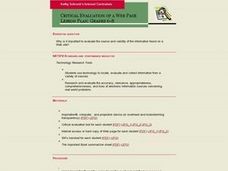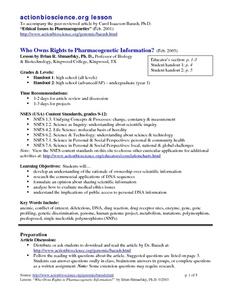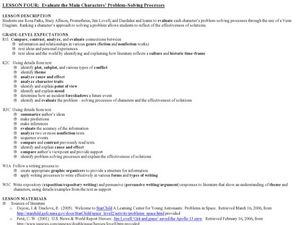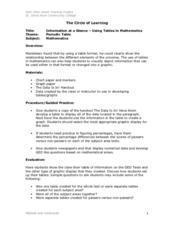Curated OER
Written Document Analysis Worksheet
Investigate different types of documents with your middle schoolers. They look at newspapers, letters, maps, reports, etc. and answer a list of questions provided. Introduce them to different primary sources!
Learn NC
Peanut Butter and Jelly and Order of Operations
Study order of operations using a peanut butter and jelly sandwich activity as your guide. The class watches you make a peanut butter and jelly sandwich based on a volunteer's instructions. They discuss the importance of following...
Curated OER
Anno's Magic Seeds
Read a tale for your class as they unravel patterns presented in the story using manipulatives. Pause to allow time for discussion and explanation of solutions throughout the story. They write equations or expressions with order of...
Curated OER
Critical Evaluation of a Web Page Lesson Plan
Middle schoolers research and examine importance of evaluating source and validity of information found on a web site.
Curated OER
Tracking down Good Information on the Web
Fifth graders brainstorm on whiteboard Web authorship and what they think they need to know about information on a website in order to judge its content. They research the solar system websites and present them to the class with their...
Curated OER
Information Problem Solving--Lesson 3 of 5
Students examine a selected story/book and practice identifying the setting, characterization, and plot. As a class, they identify problems in the story, turning points and the climax. They use a rubric to evaluate the story, as well.
Curated OER
Formal VS. Informal
Middle schoolers each get a copy of the "Formal vs. Informal" task sheet. They read the sentences twice and students put a check mark in the appropriate column on the task sheet. Middle schoolers explain orally why the form of address...
Curated OER
HOW TO EVALUATE THE TRUSTWORTHINESS OF CONTENT-ORIENTED WEB SITES.
Students objectively learn how critically evaluate Web sites for utility, trust, and reliability. In this lesson, students learn that some Web sites might be deceiving in their intent despite their popularity.
Curated OER
Who Owns Rights to Pharmacogenetic Information?
Students develop an understanding of the rationale of ownership over scientific information. They research commercial applications of DNA sequences. They analyze how to evaluate medical ethics issues.
Curated OER
Evaluate the Main Characters? Problem-Solving Processes
High schoolers read passages from several sources and evaluate the text for various criteria. In this problem solving lesson, students evaluate character problem solving processes after reading passages. They will use a Venn Diagram to...
Curated OER
Evaluating Floor Plans
Students examine what a floor plan is used for and what a floor plan should include. They compare the characteristics of floor plans and zoning to family activities/needs. They answer the questions on the worksheet as they read through...
Curated OER
Guidelines for Sexual Health Information and Disease Prevention
Students describe effective sex education and its outcomes. They provide a tool for educators, policy-makers and others to evaluate existing or new programs, curricula or policies. Students comprehend that sex education refers both to...
Curated OER
Personal Information Sheet
Learners access the material necessary to complete an employment application. They produce a personal data sheet, examine the information needed for job applications, and complete a generic application.
Curated OER
Geographic Information Systems (GIS) and Water Resources
Students demonstrate how water quality and environmental health issues can be analyzed together, how hydrologic information can be built up, and how decisions can be made using GIS.
Curated OER
SATP Basic Parts of an Informative Essay
Students identify the elements of an informative essay. Through a teacher led discussion, students explore the basic parts of a five paragraph essay and , using a hamburger as an analogy, students label the pieces. They discuss the...
Beacon Learning Center
Beacon Lesson Plan Library: Formal or Informal?
Start talking trash with your elementary English class! Then lead a discussion comparing formal and informal language. Divide the class into groups to answer a questionnaire and analyze a set of sentence cards to analyze. This is a cool...
Curated OER
Locating, Organizing, And Using Information
Students develop a topic to conduct research. They formulate questions about it and use a graphic organizer for categorizing information. Students use the information to generate a thesis to narrow the focus of the paper. They write a...
Curated OER
Information at a Glance - Using Tables in Mathematics
Students create table to display GED Testing data located in paragraph provided by teacher, use information in table to create appropriate graph, and determine percentage difference between passing scores and failing scores.
Curated OER
Sources of Information
Students review information from a previous lesson about JFK and his assassination. As a class, they identify sources they believe historians use and describe the difference between a primary and secondary source. In groups, they...
Curated OER
Introduction to Evaluating
Seventh graders are introduced to how to evaluate an electronic product. In groups, they grade the product on quality, materials and aesthetics. Using this information, they create a table of results along with a pictogram and...
Curated OER
Evaluating Progress
Teachers explore various ways to evaluate Students progress. They study the testing of word recognition, sound discrimination, grammar knowledge, oral comprehension, and oral expression. They explore ways to provide feedback after...
Curated OER
Decoding Information From the Catalog
Fifth graders identify the parts of a print catalog record as a way to find information and the location of a book in the media center. They complete a worksheet about decoding a catalog record, complete a Mad Libs activity online, and...
Curated OER
Making Decisions Based on Best Information
Fourth graders are introduced to the techniques to determine if the information they gathered was the best available. In groups, they discuss how having the best information can help them make important decisions. They also participate...
Maine Content Literacy Project
Introduction to the Short Story
How should pupils read short stories? Set them up for this unit with an introductory instructional activity that goes over the main characteristics of a short story and starts learners off reading their first short story of the unit. In...

























